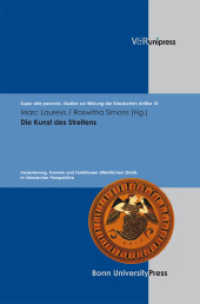- ホーム
- > 洋書
- > ドイツ書
- > Humanities, Arts & Music
- > Linguistics
- > english linguistics
Full Description
This book is a major reassessment of the French Revolution's impact on the English novel of the Romantic period. Focusing particularly - but by no means exclusively - on women writers of the time, it explores the enthusiasm, wariness, or hostility with which the Revolution was interpreted and represented for then-contemporary readers. A team of international scholars study how English Romantic novelists sought to guide the British response to an event that seemed likely to turn the world upside down.
Contents
Contents: A. D. Cousins/Dani Napton/Stephanie Russo: Introduction. The French Revolution and the British Novel in the Romantic Period - M. O. Grenby: 'Very Naughty Doctrines': Children, Children's Literature, Politics and the French Revolution Crisis - Stephanie Russo: 'A People Driven By Terror': Charlotte Smith, The Banished Man and the Politics of Counter-Revolution - Gary Kelly: 'The Sentiments I Have Embodied': Wollstonecraft's Feminist Adaptation of the Revolutionary Novel - Stephanie Russo/A. D. Cousins: 'In a State of Terrour and Misery Indescribable': Violence, Madness and Revolution in the novels of Frances Burney - Stephanie Russo/A. D. Cousins: 'Educated in Masculine Habits': Mary Robinson, Androgyny, and the Ideal Woman - Dani Napton: Revolutionary and Counter-Revolutionary Agency in Scott's Woodstock and Peveril of the Peak - Chris Danta: Revolution at a Distance: Jane Austen and Personalised History - Michael Ackland: Towards Rehabilitating 'The Long Blighted Tree of Knowledge': Mary Shelley's Revolutionary Concept of Self-Governance and Dominion in The Last Man - Deirdre Coleman: 'Adapted to Her Meridian': The Novel, The Woman Reader, and the French Revolution.








